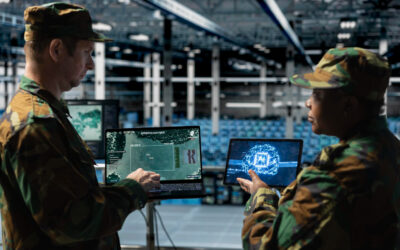In Argentina, there is currently no debate on the creation of a legal framework to regulate this new market. However, progress has been made in other types of regulations or specific applications.
This is the case with the initiative presented by the Ministry of Security last Tuesday: the creation of the Unit for Applied Artificial Intelligence in Security (UIAAS).
According to the proposal, the unit will belong to the Cybercrime and Cyber Affairs Directorate, and as detailed in Resolution 710/2024, it will be composed of federal law enforcement officers. The main objectives of this organization will be “patrolling social networks, applications, websites, and the ‘dark web’ for subsequent investigation of crimes and identification of perpetrators,” as well as “analyzing real-time security camera footage to detect suspicious activities or identify wanted persons.”
The initiative also proposes using machine learning algorithms to analyze historical crime data. In this way, it is expected to “predict future crimes, detect cyber threats, process large volumes of data from various sources to extract useful information, perform dangerous tasks (such as deactivating explosives), and analyze social media activity to detect potential threats.”
As detailed in the resolution, UIAAS will be subject to the cyber-patrol tasks previously established by the Ministry of Security in May. These activities were outlined in Resolution 428/2024, which specifies that digital surveillance “cannot interfere with the constitutionally guaranteed freedom of expression.”
Furthermore, it will also be prohibited to “obtain information, produce intelligence, or store data about individuals or users solely based on their race, religious belief, private actions, or political opinion.” Finally, the initiative establishes that the competent agencies must prepare a monthly management report.
TEXT OF THE RESOLUTION
MINISTRY OF SECURITY OF THE ARGENTINE REPUBLIC.
Resolution 710/2024
RESOL-2024-710-APN-MSG
City of Buenos Aires, 26/07/2024
CONSIDERING the File No. EX-2024-72915289-APN-UGA#MSG, the Ministry Law (text ordered by Decree No. 438 of March 12, 1992) and its amendments, Decree No. 50 of December 19, 2019, and its amendments, Administrative Decision No. 340 of May 16, 2024, Resolution of the MINISTRY OF SECURITY No. 428 of May 27, 2024, and
CONSIDERING:
That the Ministry Law (t.o. 1992) establishes the competence of the MINISTRY OF SECURITY in everything related to internal security, the preservation of the freedom, life, and property of the inhabitants, their rights and guarantees in a framework of full compliance with the institutions of the democratic system.
That the advancement of technology, particularly Artificial Intelligence, represents one of the most significant socio-technological changes for the population in general.
That countries such as the United States of America, China, the United Kingdom, Israel, France, Singapore, India, among others, are pioneers in the use of Artificial Intelligence in their government and security forces areas.
That these countries use Artificial Intelligence in Video Analysis and Facial Recognition, Crime Prediction, Cybersecurity, Data Analysis, Drones and Robotics, Communication and Coordination, Virtual Assistants and Automation, Social Media Analysis, and Fraud and Anomaly Detection.
That its use can significantly improve the effectiveness and efficiency of the different areas of the MINISTRY OF SECURITY and the Federal Police and Security Forces, helping them respond more quickly and accurately to threats and emergency situations.
That these countries are at the forefront of integrating artificial intelligence technologies to strengthen the security and protection of their citizens, improving their efficiency and effectiveness.
That, for this reason, it is essential to apply Artificial Intelligence in the prevention, detection, investigation, and prosecution of crime and its connections.
That according to Administrative Decision No. 340/24, the Directorate of Cybercrime and Cyber Affairs is responsible for: 4. Assisting the UNIT CABINET OF ADVISORS in the implementation and operation of the HIGH TECHNOLOGY CYBERCRIME INVESTIGATION CENTER (CICAT) created by Resolution MSG No. 139/22.
That through the Resolution of the MINISTRY OF SECURITY No. 428/24, the guidelines, principles, criteria, recommendations, and directives for preventive tasks of crimes in cyberspace were approved.
That the formation of Work Units is based on rationality and efficiency criteria, giving rise to dynamic and adaptable structures to changes.
That according to the above, the creation of an ARTIFICIAL INTELLIGENCE UNIT APPLIED TO SECURITY (UIAAS) under the Directorate of Cybercrime and Cyber Affairs, dependent on the UNIT CABINET OF ADVISORS of this Ministry, is timely and necessary.
That this measure does not imply any budgetary expenditure.
That the legal advisory service of this Ministry has taken the intervention of its competence.
That the undersigned is competent to issue this measure under the powers conferred by article 4, paragraph b), items 6 and 9, and 22 bis of the Ministry Law (T.O. 1992).
Therefore,
THE MINISTER OF SECURITY
RESOLVES
ARTICLE 1°. – The ARTIFICIAL INTELLIGENCE UNIT APPLIED TO SECURITY (UIAAS) is created, which will operate under the Directorate of Cybercrime and Cyber Affairs, dependent on the UNIT CABINET OF ADVISORS.
ARTICLE 2°. – The ARTIFICIAL INTELLIGENCE UNIT APPLIED TO SECURITY (UIAAS) will be headed by the Director of Cybercrime and Cyber Affairs and will be composed of areas of the Federal Police and Security Forces competent in the matter, whose representatives will be appointed by the highest authority of each of these forces.
ARTICLE 3°. – The mission of the ARTIFICIAL INTELLIGENCE UNIT APPLIED TO SECURITY (UIAAS) is the prevention, detection, investigation, and prosecution of crime and its connections through the use of artificial intelligence.
ARTICLE 4°. – The functions of the ARTIFICIAL INTELLIGENCE UNIT APPLIED TO SECURITY (UIAAS), in line with the mission outlined in the previous article, are:
- a. Patrol open social media networks, applications, and websites, as well as the so-called “Deep Web” or “Dark Web”, in order to investigate crimes and identify their perpetrators, as well as to detect situations of serious risk to security, within the framework of the National Constitution and current legislation.
- b. Identify and compare images in physical or virtual format.
- c. Analyze real-time security camera images to detect suspicious activities or identify wanted persons using facial recognition.
- d. Use machine learning algorithms to analyze historical crime data and thus predict future crimes and help prevent them.
- e. Identify unusual patterns in computer networks and detect cyber threats before attacks occur. This includes identifying malware, phishing, and other forms of cyberattacks.
- f. Process large volumes of data from various sources to extract useful information and create suspect profiles or identify links between different cases.
- g. Patrol large areas using drones, provide aerial surveillance, and respond to emergencies.
- h. Perform dangerous tasks, such as deactivating explosives, using robots.
- i. Improve communication and coordination between different Federal Police and Security Forces, ensuring that critical information is shared quickly and efficiently.
- j. Analyze activities on social media to detect potential threats, identify movements of criminal groups, or anticipate disturbances.
- k. Detect suspicious financial transactions or unusual behaviors that could indicate illegal activities.
ARTICLE 5°. – The UNIT OF ARTIFICIAL INTELLIGENCE APPLIED TO SECURITY (UIAAS) will adjust its missions and functions to the guidelines, principles, criteria, recommendations, and directives for the preventive tasks related to crimes occurring in cyber environments, as approved by RESOL-2024-428-APN-MSG.
ARTICLE 6°. – Communicate, publish, forward to the NATIONAL OFFICIAL REGISTRY, and file.






0 Comments